
No sooner had the festival started, it finished. Thursday was our last daily dash and this time we focussed on the region’s emerging FinTech sector and the so-called cost of living crisis. There is no doubt that the cost of living crisis has been one of the dominant stories of the last year, driven in part by high energy prices and rising inflation. Perhaps the region could use its strong FinTech knowledge, demonstrated by the recent launch of the North East FinTech Strategy, to make a difference? At least that was the plan.
The day followed the usual format with passionate talks by Paddy from the Regional Economic Crime Coordination Centre and Michelle Jones, the founder of Kind Currency.
Paddy talked about the effect that online fraud has upon every one of us (a show of hands told us that the majority in the room has had some form of attack) and in particular how thee had a greater impact on the vulnerable and poor.
Michelle gave us the point of view of those struggling to make ends meet and some initiatives to address their issues. What does it mean to have no money? We were reminded that any problem has a human at the end of it, that there are 15 million people in thai country in relative poverty of which 60% are working.
The group got down to the real work, thinking about potential solutions and by lunchtime we had at least two contenders on the go. The first was an app to help you find exactly what you are paying and better deals locally. Michelle let us know that she had sent some time in tent 1 and that they were also working on something similar. By a complete fluke, I ast down to lunch with a contingent form that very table and was able to swap stories and strategy. Collaboration and cooperation at work. Lunch is a powerful tool.
The second idea was to develop a mechanism whereby all people can have access to banking facilities, including homeless and rough sleepers, using biometric identity. I’m told it’s almost impossible to get somewhere to live without a bank account and being homeless is a real Catch 22. We put a lot of thought into this and felt that the advantages of such a mechanism would be to: Give homeless and rough sleeps access to money in a safe and secure way; Reduce the security risk of dealing in cash only; Allow benefits to be given directly to the needy; Enable electronic payments to be made from their account to pay for items such as food and accommodation; Allow commercial businesses to sign up to the scheme giving recipients a wide range of personal choice; Aggregate demand, through contracted facilitators, leading to lower purchase prices, increased value for money and improved corporate social responsibility. Now that sounds exciting.
That was it then. There was a meeting to sum everything up on the Friday, which Tony attended and then we were asked to put forward proposals for funding like last year. These have now been down and our fingers are well and truly crossed.
A huge thanks go to Wayne for running the event on Thursday as well as the North East Business Resilience Centre and UKC3, who made it all happen.
